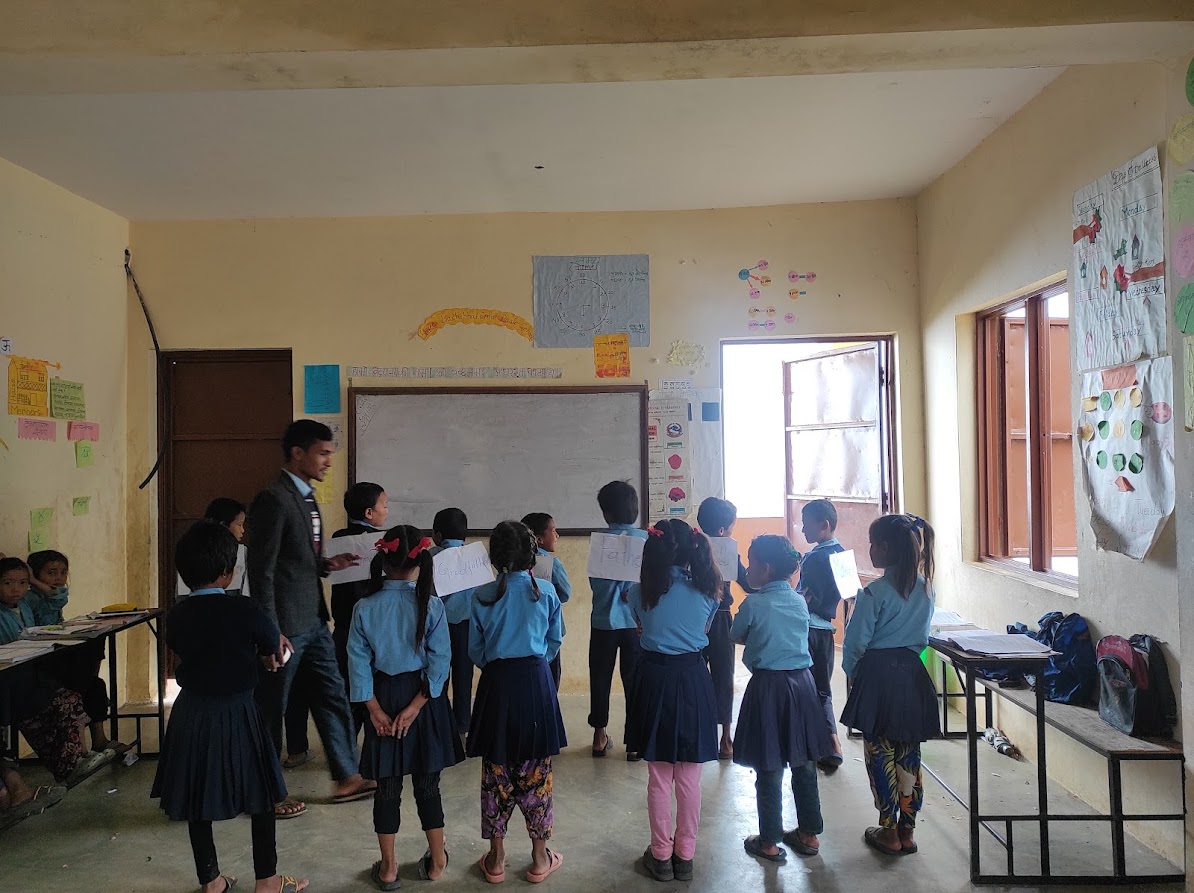
The school offers grade one through to grade five as well as pre-school services, with students aged between 3 to 14 years. The class sizes are relatively large but decrease in higher classes due to students dropping out and are decently furnished with adequate desks and benches and whiteboards.
You will be expected to teach from 10 AM to 4 PM with an hour of lunch break in between. There are 6 different subjects taught in the school. Each subject period lasts around 45 minutes.
NOTE: After the COVID-19, like many, this school has suffered in education but none was affected in health. Later while the situation was settled, it started to take the session physically.
Bachhalamai is one of the 5 schools HELP has signed an MoU with PanchPokhari-Thangpal Rural Municipality in 2021 and HELP has supported 2 Saathi Teachers for two distinct subjects; Maths and English.
Subjects taught:
All the textbooks except Nepali are in English but the students are mostly instructed in Nepali.
-
Mathematics- arithmetic, algebra and geometry are more significantly divided as you go to higher grades.
-
Science- basic ideas like living and nonliving things, plants, etc. in junior classes while textbooks in senior classes have physics, chemistry, biology and astronomy lessons.
-
English- stories, poems, biography and similar texts and grammar
-
Social Studies- society-its problems and solutions, geography, history, organizations
-
Extra English- stories with meaningful themes for the children
-
Nepali- stories, poems, biographies, Nepali grammar and similar texts.
-
Hamro Serofero - Population and Health, science, surroundings education
Students’ Level of English Comprehension
Senior Classes (Grade 4 and above)
Reading- Some of the students can read the texts in their books and actually understand them very well
Writing- Some of the students can manage to write well-coordinated sentences but mostly memorized ones from the books, so actual understanding is fairly limited.
Speaking- some of the children can communicate quite well with the volunteers; more easily as you go to higher classes and the children aren’t shy)
Junior Classes (Grades 3 and lower)
Reading-some of the students can read the texts in their books without pausing, but actual understanding is quite limited.
Writing- most students can write some simple grammatically correct sentences but more theoretical; often the ones copied from board or memorized from books and understanding is fairly limited).
Speaking- can’t really manage to communicate with the volunteers but students aren't shy, your approach to speak to them encourages them to speak English.
Speaking- can’t really manage to communicate with the volunteers but students aren't shy, your approach to speak to them encourages them to speak English.
Teacher’s level of English: All the teachers can communicate but don’t have good command over English. The teachers like communicating with the volunteers and your conversation, as well as corrections can be really helpful to build up their confidence in English.
Exams: Teachers construct questions and exercises from the textbooks. They have simple monthly tests and more important exams every 4 months.
Resources available:
-
All classrooms have whiteboards.
-
Volunteers are recommended to train/ encourage the teachers to use the computer.
-
Resources for extra- curricular activities: Most of the time the school only has a single set of equipment for simple games like skipping, badminton, etc. so needs constant addition. The school has now upgraded its playground to make it appropriate for sports like football but as the playground is not fenced as of yet, so sports activities should be conducted very carefully.
-
The school has a regular drinking water supply.
-
The students enjoy drawing and coloring but most of the time, the school has limited stock of drawing papers and colors and so needs constant addition/replacing.
-
Extra-curricular resources: The school playground, which is small in size, has been recently fenced. So, the outdoor games that can be played include- Football (gently), volleyball, badminton, Frisbee, and softball. Badminton, rings and skipping are popular among the girls.
-
How to teach effectively: The school owns a textbook for each school subject. You can copy a list of topics from the textbooks that you feel you would like to teach using the materials you have brought and/or the techniques you have acquired and teach in your own way. This will give the local teachers an idea of how to teach the rest of the chapters in the book in an interactive way. You can be an inspiration for the local teachers.
-
The children love doing homework if the homework is interesting, so keep giving them some creative assignments every day to make sure the students are revising their lessons. Try making the students take advantage of the environment they have. E.g. herbarium, collection of wild fruits and flowers, etc. You can bring stickers that you can paste to the exercise books of students who do the best homework and classwork. This really excites the students and the class environment hence inspiring them to learn properly and also to be disciplined.
Things that could make teaching easier for you: Card games for improving vocabulary and teaching sentence structures, teaching aids to help teach pronunciation (as most the teachers learnt English pronunciation in the wrong way, the children learn it wrong as well. It is a wonderful opportunity for you to make the children’s basics of English up to date). Whiteboard markers would also be useful.
- HELP projects so far:
- Future needs
HELP projects so far:
- Construction of 4 new classrooms completed in 2014
- Books for mini library facility
- Sports equipment support
- Classrooms management- classroom furniture, whiteboards and notice boards
- Workshops and teachers training
Future needs
- Nursery classroom management
- Teachers support grant
- Textbooks support
- Teachers training
- Playground management
- School In A Bag- Proposed for Phase V
- Sports equipment including table tennis board
- Playground expansion and fencing